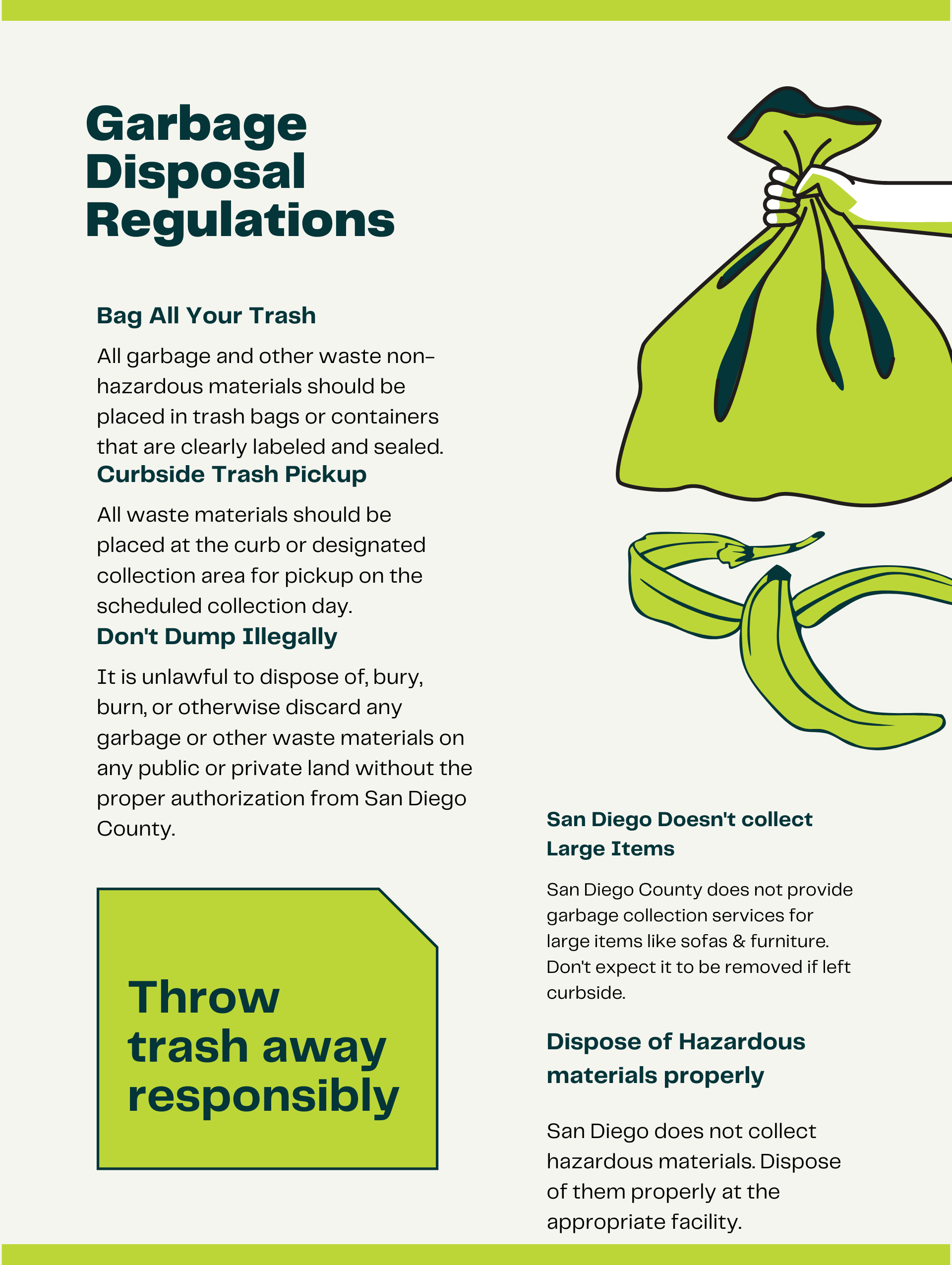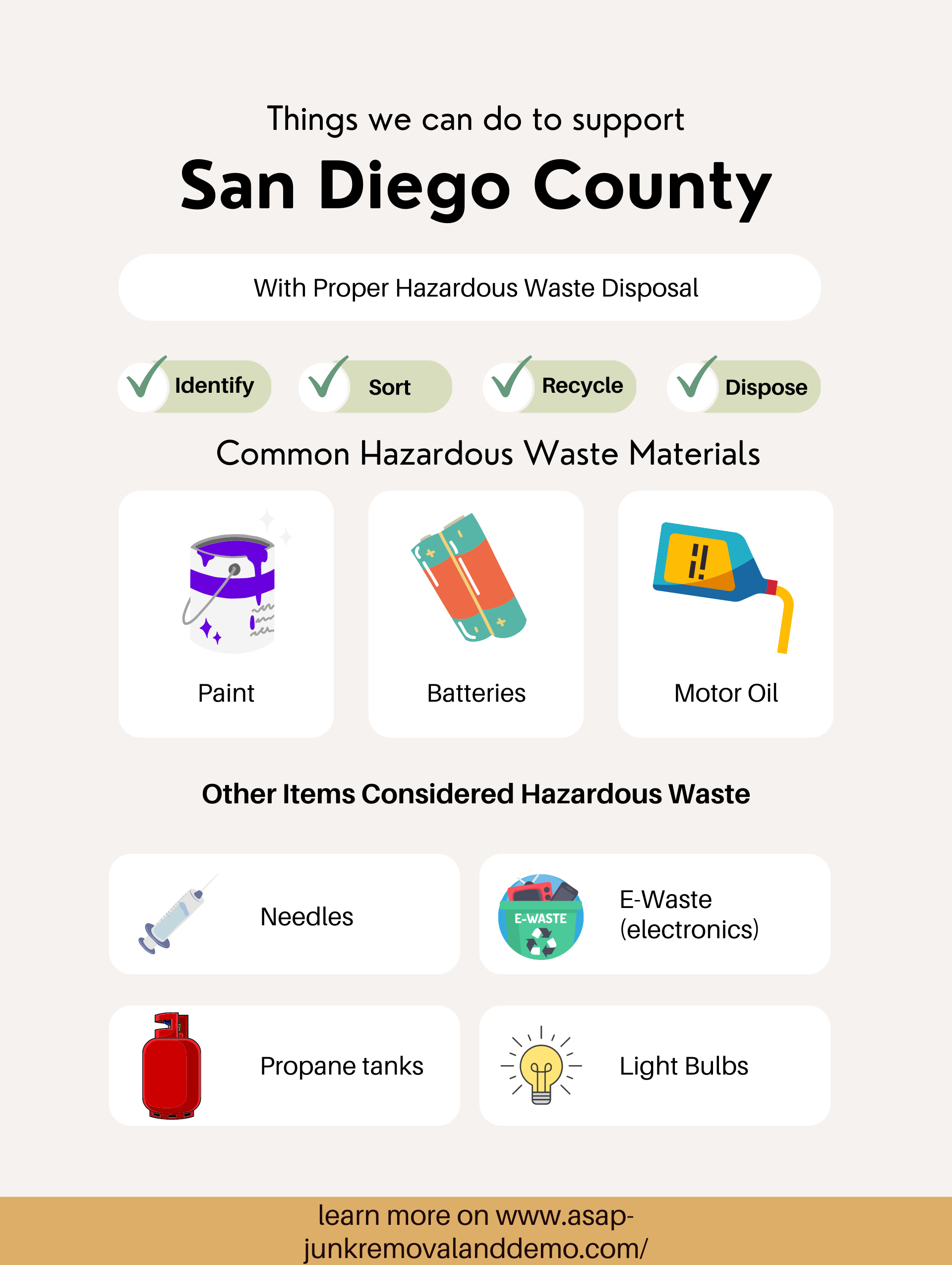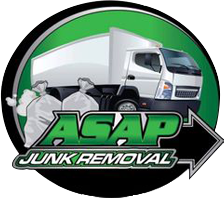San Diego Dumping & Waste Disposal Regulations
Know your Local Dumping Laws.
Know Your Local Waste Disposal Laws
San Diego County is a beautiful region boasting lush landscapes and stunning beaches. Sadly, improper dumping can lead to severe consequences such as environmental pollution, wildlife harm, and health hazards. In order to ensure the region's cleanliness and safety, it is crucial to understand the regulations in San Diego County.
This article will discuss dumping regulations, hazardous items, and public garbage collection services that make proper dumping & waste disposal in San Diego County possible.
San Diego County's Garbage Disposal Regulations
- All garbage and other waste non-hazardous materials should be placed in trash bags or containers that are clearly labeled and sealed.
- Garbage, recyclables, and green waste will be collected on the same day each week.
- All waste materials should be placed at the curb or designated collection area for pickup on the scheduled collection day.
- All materials should be put out for collection by 6:00 a.m. on your designated garbage collection day.
- Recyclable materials should always be separated from non-recyclable materials and placed in clearly labeled and sealed containers.
- Compostable materials must be kept in clearly labeled and sealed containers.
- It is unlawful to dispose of, bury, burn, or otherwise discard any garbage or other waste materials on any public or private land without the proper authorization from San Diego County.
- The County does not collect trash on major holidays such as Thanksgiving and Christmas.
- The County does not collect hazardous materials. The materials should be disposed of at an appropriate hazardous waste facility.
- The County does not collect large items such as furniture, carpets, and construction debris. These items must be disposed of at a landfill or with the aid of a junk removal service provider.

What Does San Diego County Consider Hazardous Waste?

Household hazardous waste is any product found in the home that can be potentially dangerous to people, animals, and the environment if not disposed of properly. Examples of household hazardous waste include aerosol cans, antifreeze, cleaning products, gas and oil, paint, pesticides, and pool chemicals. These products can be highly toxic if not disposed of properly and leak into the environment, polluting air, water, and soil.
Hazardous Items
-
PaintList Item 1
The paint contains various chemicals, such as solvents, pigments, stabilizers, and heavy metals, such as lead, chromium, and mercury. These chemicals and heavy metals contaminate water and soil if not correctly disposed of.
-
BatteriesList Item 2
Household batteries contain heavy metals, like lead and mercury, which harm humans and the environment. Improper disposal of batteries leads to contamination of soil and water and can result in health issues for people and animals.
-
Motor OilList Item 3
Motor oil and oil filters are considered hazardous waste due to their potential to release toxins, such as lead, arsenic, and other dangerous materials, into the environment. These materials can cause contamination of water and soil if not managed and disposed of properly.
-
Propane Gas CylindersList Item 4
Propane gas cylinders are considered hazardous waste because they contain a flammable gas, which can be dangerous if not disposed of properly. Improper disposal of propane gas cylinders can lead to fires, explosions, and air and water pollution.
-
Light Bulbs and Lamps
Light bulbs and lamps contain hazardous materials, such as mercury, lead, and other toxic chemicals, which, when released into the environment, poses a danger to life.
-
Medications
Medications, prescription and over-the-counter, contain various chemicals, such as hormones, antibiotics, stimulants, and antihistamines. If these medications are flushed down the toilet or sink, they can contaminate water sources, leading to various environmental and health risks.
-
Needles
Needles, lancets, and other sharp medical items contain high levels of bacteria and viruses because they are often used on patients and come into contact with bodily fluids, such as blood, which have these organisms. If these items are not correctly disposed of, they can pose a risk of spreading these bacteria and viruses to other people.
San Diego's Public Waste Management Services
We specialize in providing expert service to fill your online needs.
Miramar Landfill & Greenery
A large-scale waste management facility in San Diego County, California. It covers over 1,400 acres and provides essential waste disposal and recycling services to residential, commercial, and industrial customers in the region. The landfill operation is complemented by a greenery that processes yard waste into mulch and compost, with over 50,000 tons produced annually.
LEARN MORE
Recycling Programs
San Diego offers waste reduction programs and services designed to help residents and businesses reduce the amount of trash they produce. These programs and services include educational programs and workshops to help people learn about waste reduction techniques and practices and services such as composting and other waste reduction initiatives.
LEARN MORE
Residential Garbage Collection Service
San Diego County provides weekly residential garbage collection services to all its residential customers. The residential collection services include the collection of regular household garbage, recycling, and green waste. Customers can place these items at the curb for collection on the designated days for their area.
Collection Events
To provide a convenient and responsible way for households to dispose of hazardous waste, the City of San Diego organizes collection events twice a year, in the spring and fall. These events aim to prevent the hazardous materials from ending up in Miramar Landfill, reducing the environmental impact of waste disposal.
LEARN MORE
Contact Us Any Time For Your Junk Removal Needs


